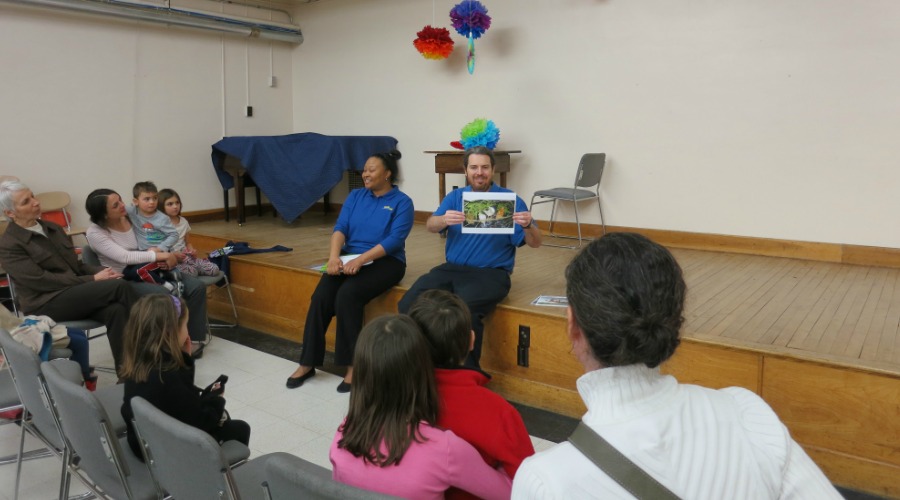 We invited children ages five and up and accompanying adults to learn about and celebrate wildlife with us at the Jamaica Plain branch of the Boston Public Library. We discussed how children around the globe celebrate wildlife throughout the year, and why it is important to create safe spaces for them. We then explored the lives and unique qualities of various endangered animals, using the book Let’s Save the Animals by Frances Barry. And perhaps most exciting of all, the participants got the chance to assume the experience of a local wildlife animal. Through an interactive brainstorming activity, the children and adults chose the urban habitat that they felt they’d be most at home in. We ended by picking up Barry’s book once more to explore some of the simple ways we can make a difference for animals through our everyday actions.
We invited children ages five and up and accompanying adults to learn about and celebrate wildlife with us at the Jamaica Plain branch of the Boston Public Library. We discussed how children around the globe celebrate wildlife throughout the year, and why it is important to create safe spaces for them. We then explored the lives and unique qualities of various endangered animals, using the book Let’s Save the Animals by Frances Barry. And perhaps most exciting of all, the participants got the chance to assume the experience of a local wildlife animal. Through an interactive brainstorming activity, the children and adults chose the urban habitat that they felt they’d be most at home in. We ended by picking up Barry’s book once more to explore some of the simple ways we can make a difference for animals through our everyday actions.
Our program aligned with many of the principles included in our own resource section on humane education. We are also grateful to find materials from HEART (Humane Education Advocates Reaching Teachers) on protecting urban wildlife that we were able to successfully incorporate into our program. A fun and meaningful time was had by all!
We went away with three takeaways:
- Children can be good problem solvers when it comes to protecting animals, if given the opportunity. Not only can children be good problem solvers, but they are often eager to take on this role. This is particularly true when it comes to problems involving animals. However, they need adult encouragement and support. Among the simple strategies explored in our session to help animals were turning off the lights, recycling paper, and using less water.
- Humane Education is for children and adults. Often, humane education is perceived as something that happens only within elementary school rooms. However, it is something everyone can benefit from at any age in life. Humane education need not take place in brick and mortar institutions of learning. It can present whenever we learn about a pressing social issue that needs addressing in a newspaper, book, or before our very own eyes. By the same token, everyone has the power to become a humane educator, no matter their profession. Check out World Animal Net’s calendar of events to learn how others are tackling some of the most pressing challenges facing animals today.
- We are all interconnected.In our busy and congested worlds it’s easy to lose our connection with nature and all of its inhabitants. Taking a simple and relaxing walk to observe our surroundings can help re-connect our relationships and re-instill our appreciation for all that lives around us.
Has your organization implemented humane education in its programming? We’d love to hear your stories!
Photo credit: Akisha Townsend Eaton, World Animal Net

